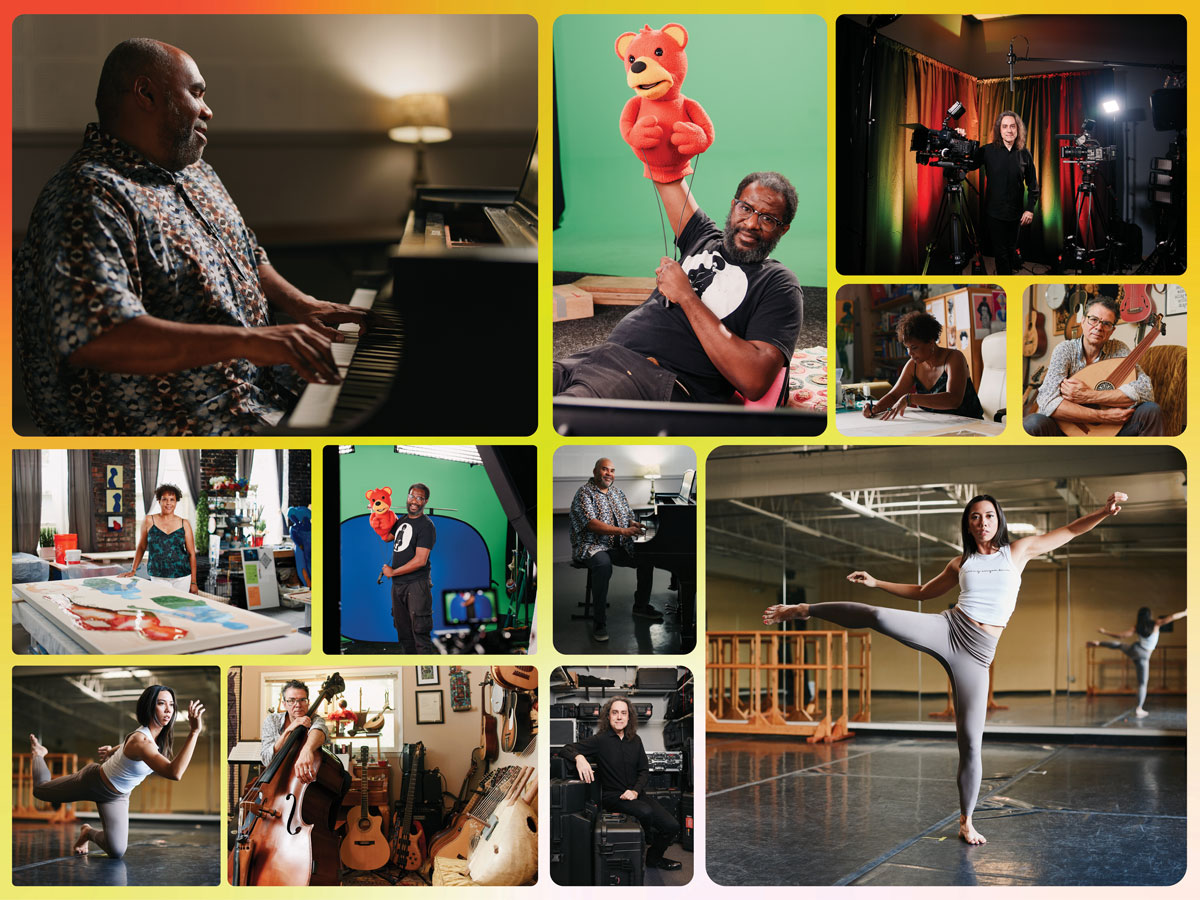
Photographs by Ben Rollins
Creativity is one of life’s great mysteries. No one can bottle it or demand it or even truly define where it comes from. But artists of every genre recognize it when the moment of inspiration hits them. We spoke to 16 Atlanta artists about their creative processes—visual artists, dancers, musicians, actors, and more. What ignites their creativity? How do they turn an idea into art? How do they overcome a creative block? What are the challenges of shifting to the business side of being an artist?
Their answers are illuminating, sometimes humorous and often profound. Creativity is the gift that frees the soul, and these artists reveal how that freedom shapes not just their art, but also their very way of seeing the world.
By Benjamin Carr, Lauren Finney Harden, Mark Thomas Ketterson, Tess Malone, and Gillian Anne Renault
Edited by Scott Freeman
Photographs by Ben Rollins
![]()
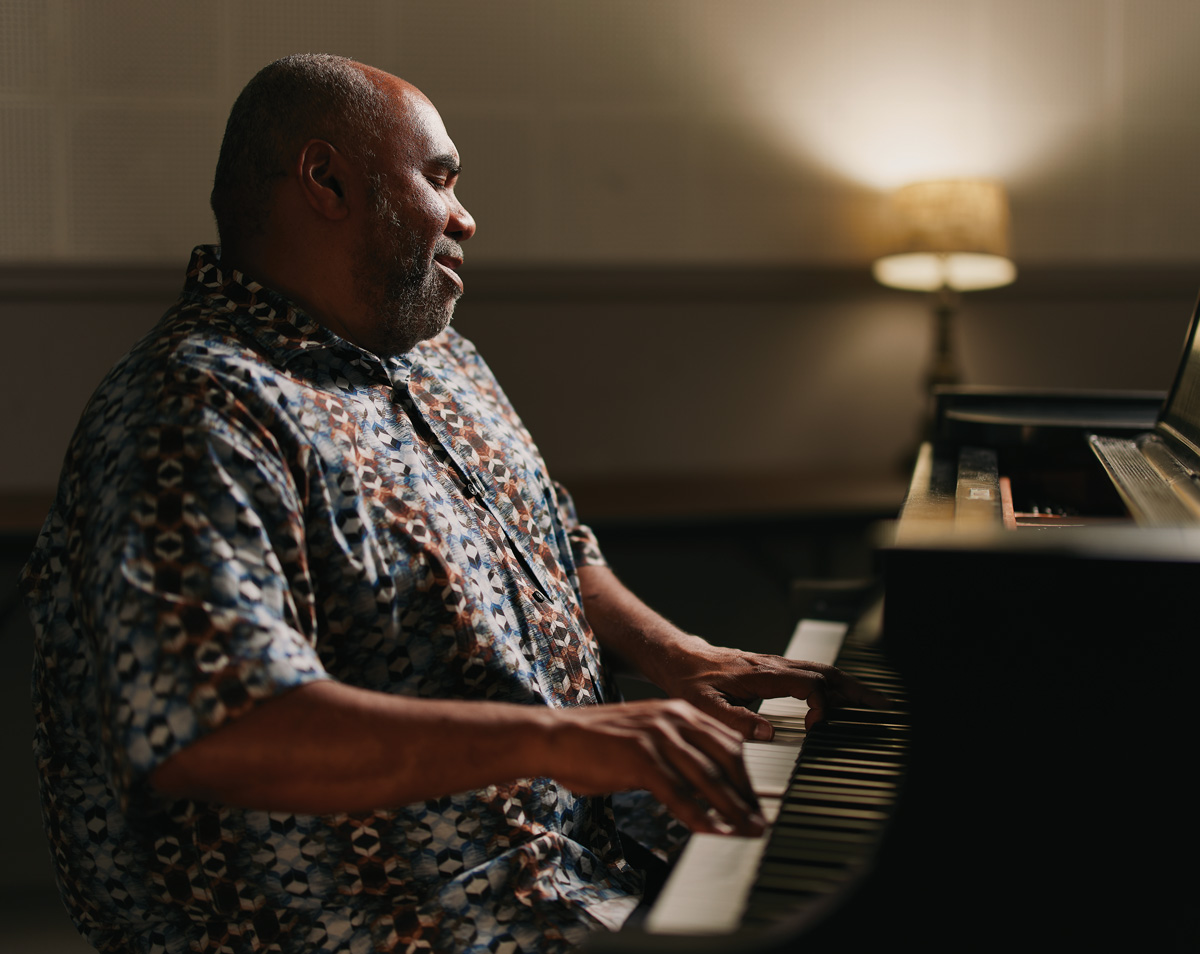
Photograph by Ben Rollins
What is the Creative Spark?
“Years ago, I had the opportunity to interview Alice Walker, and I asked her, after all these years of writing, how did she ‘will the music’ so to speak? She said, ‘My job at this point is to be an open vessel, to be available for when it happens.’ I feel like that’s true for me as well. I do things in my life to make sure I’m open for when it happens.” —Kelundra Smith: playwright, theatre critic, and journalist
“We live in such a highly sensory world now where you have to be touching something all the time. It doesn’t give you time to be bored. But boredom is key to creativity because it allows your mind to escape and imagine. As a kid, I used to be told in class to stop daydreaming, but as an adult I give myself permission. I put myself on ‘tech punishment.’ I don’t keep social on my phone. My iPhone is on ‘do not disturb.’ I haven’t owned a TV in two decades. It gives me time and space to really think and pull from a deep well of my own experiences and creativity.” —Shanequa Gay: visual artist
“What compels me to keep moving forward is a hunger to share my fascination and the love of mystery. Creativity for me is sharing something you can’t put words around. It’s exciting. —George Staib: founder and artistic director of staibdance
“Of late, I spark my creativity through friends, with friends. I have been creating with artists whom I love and admire. That has been incredibly generative. I have really enjoyed creating work within my community. Because if the community is built on the right foundation, there is an accountability around the work built into that because we’re making it together.” —Garrett Turner: actor, singer, poet, and playwright
“Creativity is like a sneeze. It’s an impulse you have inside that you have to let out eventually. I have to do this. I have to. If I don’t have something creative to do . . . well, I’m dangerous when I’m bored. You do not want to be around me when I’m bored.” —Michael Kurth: composer and Atlanta Symphony Orchestra double bassist
“For me, creativity is the ability to utilize all parts of myself. It’s to be inspired by everything, the people around me, nature, the environment and then to put something out there that matters to me. The thrashers that fly around me when I walk out of my door every morning, they inspire movement and the way I see things. I look at nature—how beautiful flowers are. That impacts my creativity. I feel I am getting more curious and more creative as I get older. This is an exciting time for me.” —Nena Gilreath: cofounding director of Ballethnic dance company
“God, where do good ideas come from? I wish I knew so I could always go back there. I do walks. Lots of walks. Walks to get inspired. Walks to clear my head. Walks to try to solve a problem. Lots of walking.” —Lee Osorio: actor, playwright, and director
“Sometimes you get moments where you are outside of your body looking down at yourself. Your subconscious takes over and things happen. As a creative, I think that is what we always want to go towards.” —Tyrone Jackson: jazz pianist and Kennesaw State University music professor
![]()
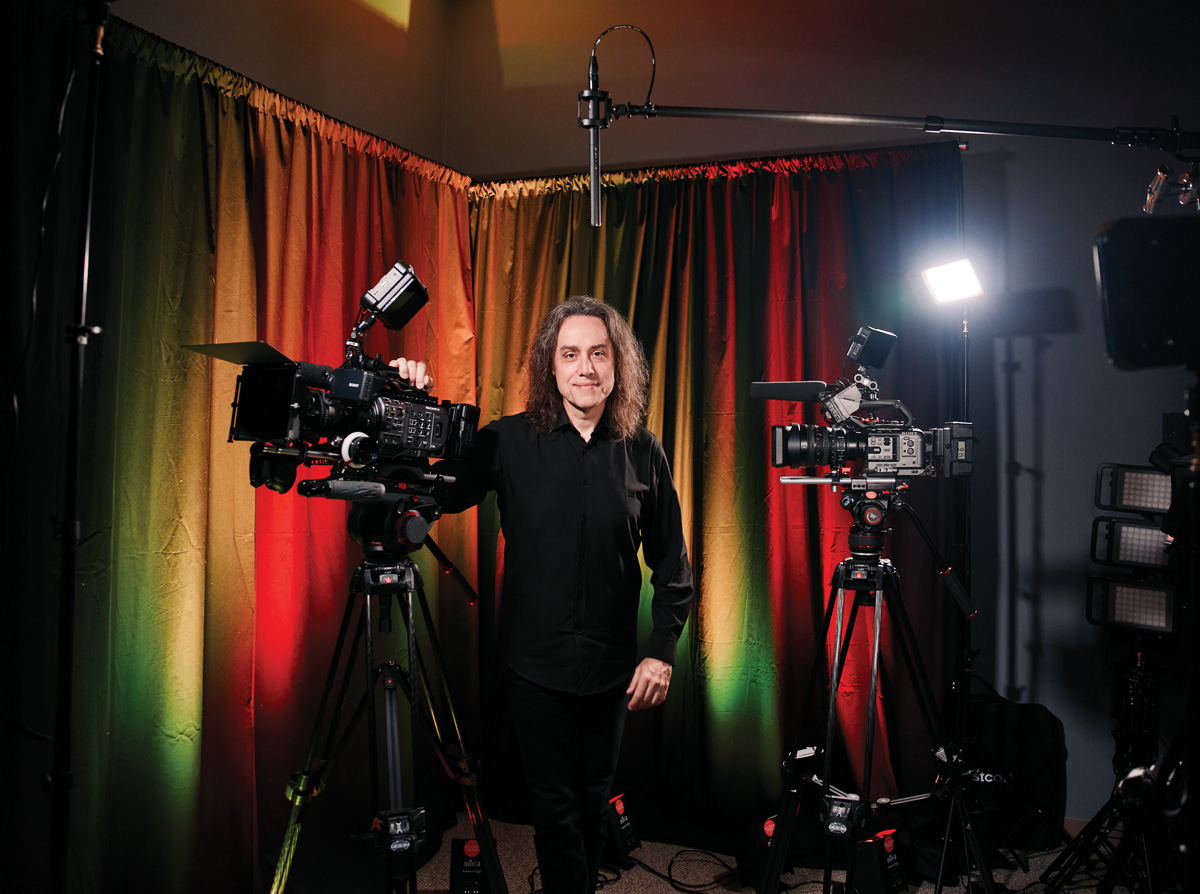
Photograph by Ben Rollins
Turning an Idea into Art
“If you want to be a successful writer, the ego has to be checked. I envision myself hanging my ego like a hat on a door hook. Just know your first draft is going to be terrible. Writing a novel is running a marathon; you can’t jump in and expect to complete the 26 miles right away. It’s months and months of getting up and saying you will commit.” —Zoe Fishman: novelist and writer
“My process is influenced by what I feel, and by instinct, intuition, and the integrity of what I want to create. I have a lot of angst; I wrestle with things and ruminate. If I don’t know the direction of a project, many times I go for a walk. I walk inside, outside, at home, at work, and maybe again in the evening. As I walk, I start formulating a through line from a splatter of different thoughts.” —Nena Gilreath
“I’ve structured my life in a way that my Saturdays and Sundays are my own to write. I’ve also created good boundaries and communication with my family and friends, so that when I’m in a ‘writing season’ or trying to get something done, they know not to call me before four o’clock on Saturday or Sunday. I treat it as sacred time.” —Kelundra Smith
“You have to get through the bad so that you can get consistently good. I’ve written a lot of bad stuff, but I had to. They were an impulse that I had to get out of my system but then left them there collecting dust. Haydn wrote 108 symphonies. How many of them do we know? He probably wrote some stuff that wasn’t really worth prosperity’s respect.” —Michael Kurth
“Creation of a new work is about riding a wave and allowing it to unfold into something that’s as relatable as possible.” —George Staib
“It’s a lot like quilting. A lot of my life I’m collecting stories—these little bits of fabric that might seem ugly or disposable to others but catch my eye. And eventually, when a pattern starts to become clear that all these bits of fabric could fit into, then you start constructing the quilt. There’s a lot of guesswork and intuition about the process.” —Lee Osorio
“Assume you’re never going to be perfect. Nothing is going to be perfect-perfect-perfect in this world, but it’s going to have an impact. It’s going to be incredibly meaningful and beautiful for what it is. I don’t think perfection is the goal. It’s not to make something perfect, it’s to make something that can connect with people.” —Felipe Barral: filmmaker and musician
![]()
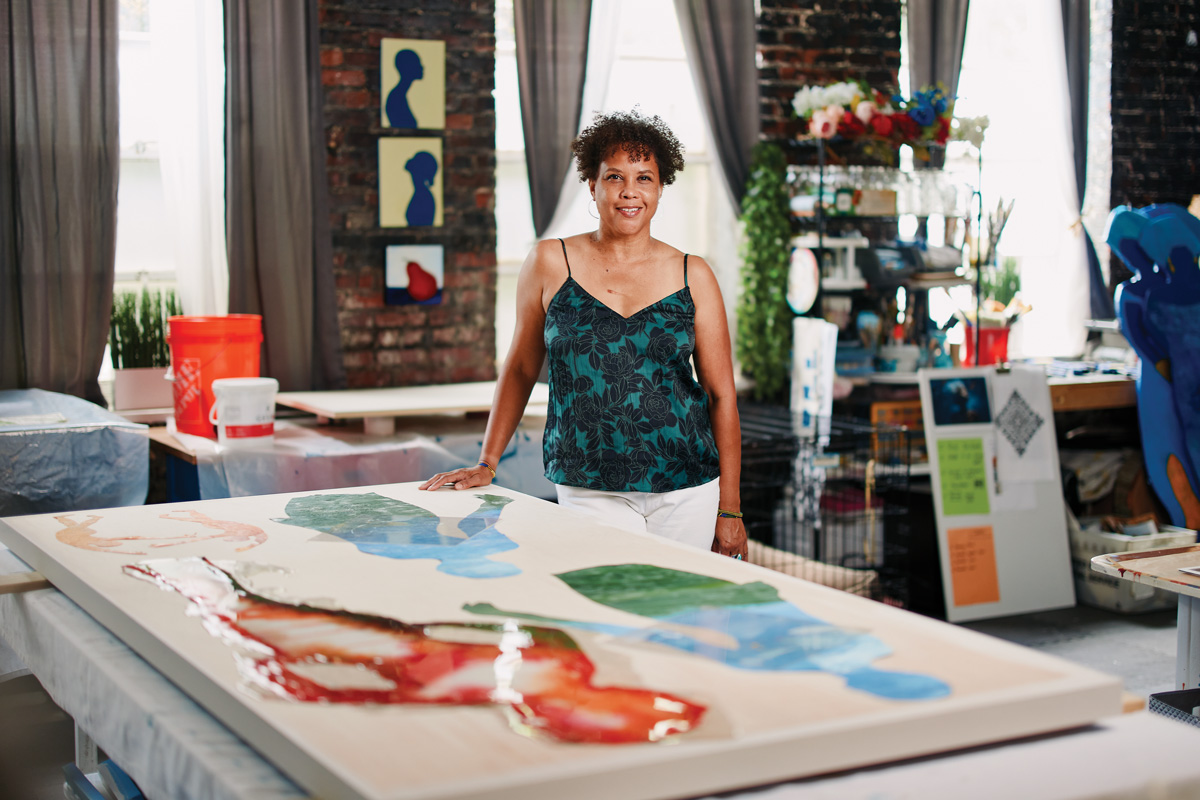
Photograph by Ben Rollins
Wrestling With Perfectionism
“I don’t believe perfection exists, so while I try and do my best, it’s important for me not to be too precious with anything. Definitive answers don’t really exist in the artist community. ‘Done’ doesn’t really exist outside of a deadline.” —Raymond Carr: puppeteer and filmmaker
“When you’re younger, you’re competitive and trying to prove yourself. But at this point in my career, I’ve done enough to solidify myself. I’m trying to refine now and better understand who I am and what I have to say about the South. But that answer is being edited daily. I don’t have a right or wrong. My rule is I am a daughter of the South, I am telling Southern stories, and I don’t have to tell the story the same way every time.” —Shanequa Gay
“When I was a young dancer, I thought there were absolutes, that perfectionism was all about doing things ‘the right way.’ As I have matured, I think ‘the right way’ can be many ways. Perfection? There is none. The most perfect thing is nature, and it’s always changing. I tell students nothing will be perfect. I don’t think perfectionism serves anyone well.” —Nena Gilreath
“I veer towards perfectionism. That might mean I live with something a little longer before I put it out, or I might shut something down right there. Of course, then I will go back years later and think it wasn’t so bad.” —Diane Durrett: musician, songwriter, producer, and president of the Atlanta chapter of the Recording Academy
“I don’t know what perfection would even look like. My work is consistently evolving. Even when it’s on stage, I can see 10 more ways I can dig deeper into an idea and explore and expand, make changes and revisions. To me, perfection doesn’t exist.” —Jacquelyn (Jacque) Pritz: dancer, choreographer, and founder of Catching Mangoes
“I’m a professional musician. Perfection is a curse right there. No matter how good you get, your standards will always beat that. You can play what’s on the page, and that can be objectively perfect, but can a creative effort ever really be perfect? Perfection isn’t about what is objectively perfect. It’s art.” —Michael Kurth
“When the Black movement popped off in 2020, all my artist friends contributed work, but I couldn’t create anything. I didn’t fit the energy of rage, angst, and anger. My work was about peace and rest. I was in my studio for two weeks stuck asking: What do I do? Should I change? I was talking to a friend of mine about this dilemma. She said, ‘Art is not just one area: it’s the full spectrum of life. What you’re creating is that place for when we need to rest. Do what you’re doing, put it out, and it contributes to what we’re experiencing.’ That really gave me a sense of purpose.” —Tracy Murrell: visual artist
![]()
Creative Blocks
“Most of the time if I get blocked, it’s not the subject; it’s me. It’s my viewpoint that becomes the problem. That viewpoint could be literal, but if it’s literal it’s easy to find a different viewpoint or change stimuli. If it’s internalized, it’s a bigger nut to crack. I have to ask what’s causing this disconnect? What’s shutting me down? Maybe I just need a change of context or an attitude adjustment. I either walk away from it or pick up a different tool or process. It’s more of an act of acceptance. It tells me I should go walk the dog, pet the cat, or just change the environment.” —Charlie McCullers: photographer
“I go for a walk, get out in the sun, and try to get my mind off the work. Then I sit down, set a timer, and make myself fill a page—whatever comes. Some ideas are promising, some are terrible, but the point is to keep moving. I’ve learned not to wait for inspiration—it usually finds me once I’ve already started. The ideas don’t come from thinking. They come from doing.” —Elisabeth McNair: illustrator, cartoonist, designer
“When you’re a kid, you are malleable. As adults, we get so complex with our thinking. Sometimes, if you revert back to the simple things that got you interested in the first place, your brain becomes malleable again and you get unstuck.” —Tyrone Jackson
“I walk away from the whole thing. Whenever I try to force an idea, it never works. Then after a few days, seemingly out of nowhere, the solution arrives. The idea has its own life.” —George Staib
“I have always loved riding a bike because you are surrounded by nature, in the zone, with your body attuned to the bike. You’re doing exercise that’s going to give you an adrenaline push. You focus on the line where you’re going, and you free your mind from any other kinds of thoughts. And you feel that freedom of the wind in your face, that joy you had when you were a kid. Then you can go back to being creative.” —Felipe Barral
“There is always something else to do, some editing or other iron in the fire that is less creative that I can do to fill the time until another ‘sneeze’ happens.” —Michael Kurth
![]()
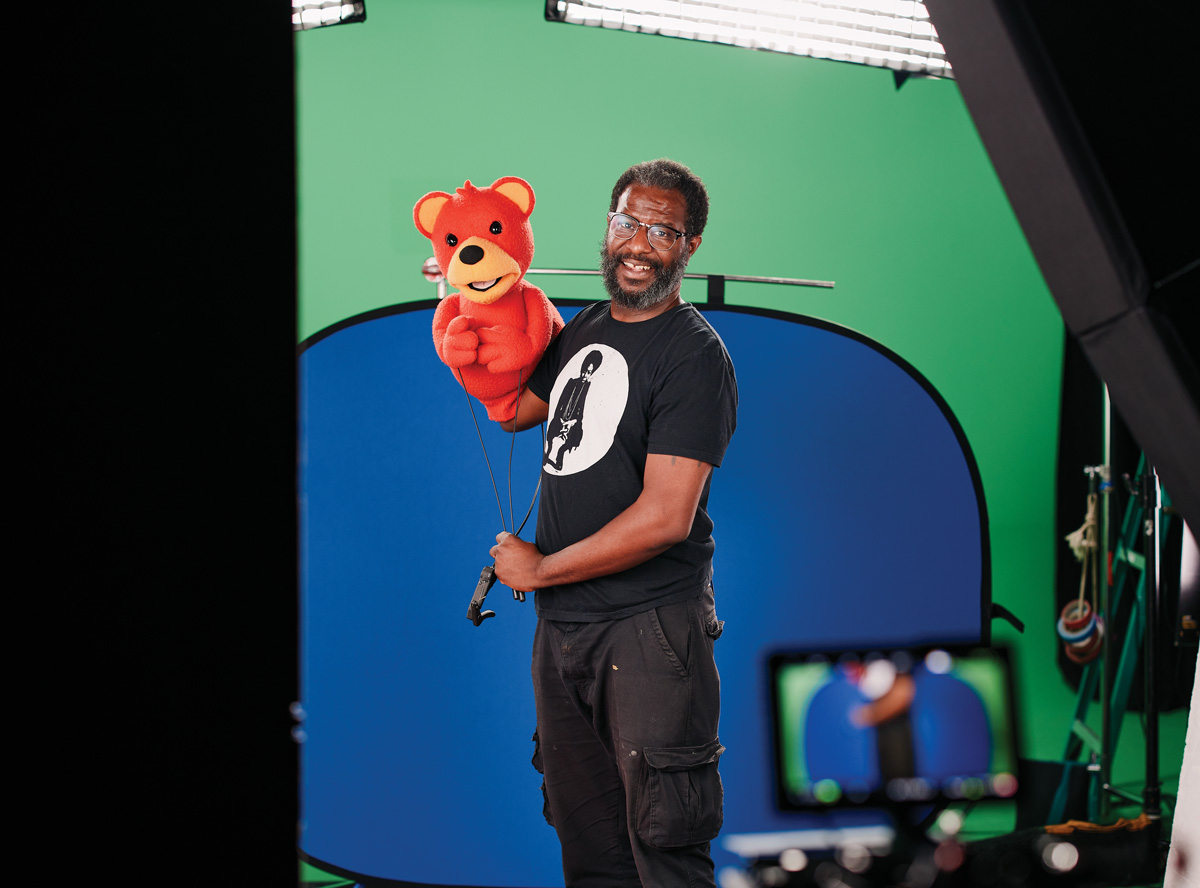
Photograph by Ben Rollins
Embracing the Business Side
“Making money from your art complicates it. Not necessarily in a good or bad way, but when you depend on art to make a living, you have to form a different relationship to the work. I take projects I don’t like, ones with messages I don’t think are helpful or healthy or where the writing isn’t great. I record audiobooks. About 20 percent of them in a given year are smut under a pseudonym. But they are still part of my spiritual practice, still helping to develop my empathy—I have to put myself in the headspace of someone whose life will be made better by werewolf porn that I think advances some questionable gender roles. That is hard for me personally, but it’s a helpful exercise.” —Lee Osorio
“I reached a compromise early on that I would understand the market of how I can get paid to take pictures and make sustainable personal projects. You’ve got to eat, you need a roof over your head, you need to be healthy—all that ‘dad’ stuff. The best way you can be happy with your creative side is if you don’t feel like it’s destroying your life in the process.” —Charlie McCullers
“If I know my business, I will be able to protect my writing and my voice. We are all in this rodeo trying to hang on in the business of today.” —Diane Durrett
“If you don’t make money with your art, I don’t see it as a limitation. Just do it because it frees your soul, it empowers you to say whatever you want to say. Find a job that supports paying the bills but still create. Don’t use it as a limitation.” —Felipe Barral
“Social media and artmaking are two different jobs. I’m not an influencer, but I need to advertise what I’m working on so people can see what I’m doing and potentially hire me. It’s a necessary part that I’m not going to fight anymore. Instagram can be your portfolio and another creative outlet. When I put together an ad or poster advertising my work, it scratches that creative itch.” —Raymond Carr
![]()
The Importance of Workspace
“My studio space has creatives on all three floors. Most are visual artists, but there are also musicians and even a soap maker. It’s important to have that community and not feel alone. Whatever I’m working on, I’m sharing with artists in the building. My framer is on the second floor, so all I have to do with big pieces is ask him to come look at it; before, I would have to buy a truck to transport a piece. I’ve created a tribe. Sometimes I get stuck, or I’m stressed out, but having other creatives around me where I can just talk and listen to what they’re going through shifts me from whatever I’m anxious about. I get ideas on how to solve problems.”—Tracy Murrell
“Put your phone into airplane mode. We didn’t have to worry about that kind of thing much before, but now distractions are always popping up. Clear your space of distractions. That gets harder and harder to do now.” —Diane Durrett
“Environment is extremely important. I need to have everything accessible, and I need to have a comfortable chair.” —Tyrone Jackson
“I do most of my writing in coffee shops. I like a little discomfort. A healthy amount of distraction and easy access to caffeine. I don’t work at home. If my dogs see me on my computer they want to help type. Given that most of my writing is done before, during, or after other work, I’ve gotten pretty good at pulling out my laptop and working on planes, on set, anywhere that’s not home.” —Lee Osorio
“Back in the day, I used to get up at five o’clock every morning and write according to the outline that I had crafted for the novel, no matter what. It was wonderful because at that time in the morning, the voice of self-doubt isn’t awake yet, so you just write. That was a way that I worked for a really long time, and then I had babies, and they were up at five, and so it shifted. I think the hardest part about writing for me now is having to fit it in on the fly, as opposed to a structured time every day.” —Zoe Fishman
![]()
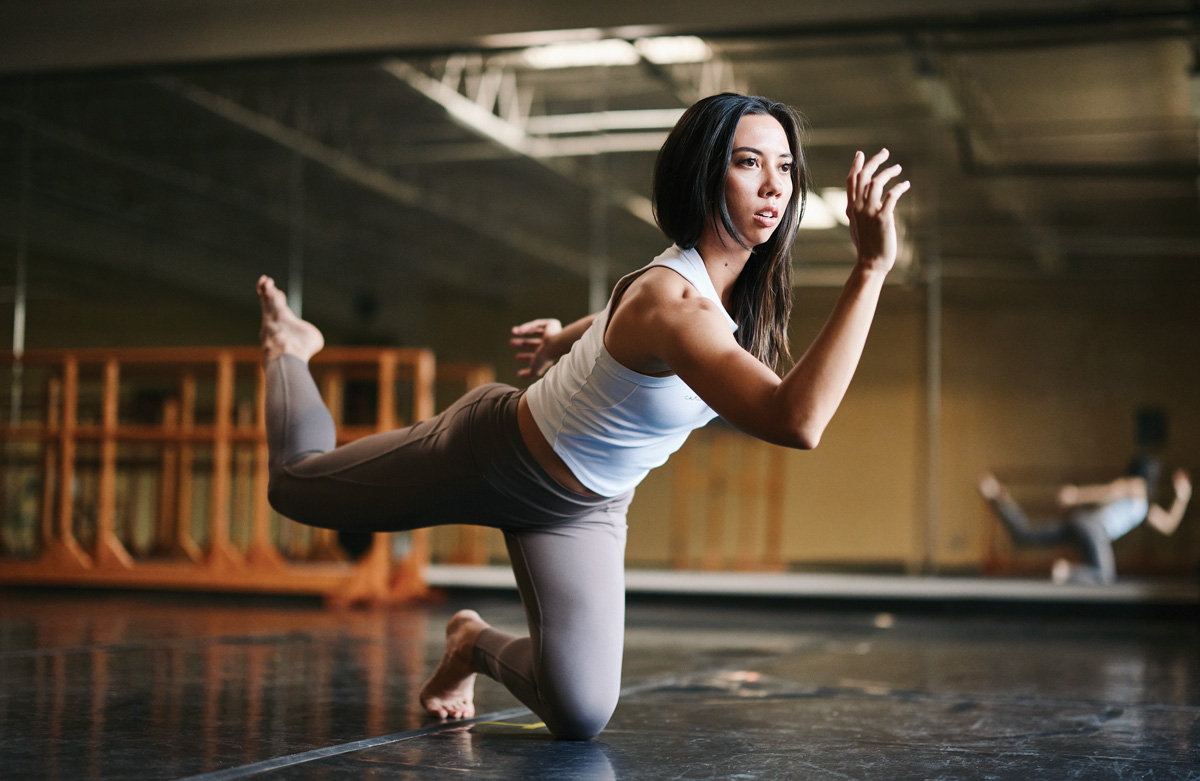
Photograph by Ben Rollins
Knowing When It’s Finished
“You can talk to a lot of artists, and they’re never satisfied with the piece. But at some point, you have to let it go, right? At that point, it has to go to the audience and be seen and take on a life of its own.” —Felipe Barral
“I really struggle to know when to stop tinkering. The wonderful thing about making theater —which accounts for about half of my creative practice—is that it’s never really done. Every production, every night of that production is new and different. It’s never really done. Which I enjoy.” —Lee Osorio
“I don’t think you are ever finished.” —Tyrone Jackson
“I rely on deadlines. Without them, I’d keep tweaking forever. There’s always another idea I could try, but at some point, I have to stop and trust what’s there. Sometimes the sketch has more life than the polished version, and I’m trying to learn not to erase that.” —Elisabeth McNair
“I step back and decide when it’s done and feels like it’s good. I am also informed by friends because I am my own worst critic. I ask artists, curators, and consultants, but I try to be mindful not everyone is in the art world because artists are going to ‘art’ the hell out of you. Writers see the work differently. Electricians see the work differently. Having all kinds of people come into space and look at work is helpful because there is no right or wrong answer when you’re taking in and looking at art.” —Shanequa Gay
“For me, it is not so much knowing that it is done—the critical moment is knowing that it is going to be done. It’s like climbing a mountain of ideas and execution. There is still work to do, but you can see a finish line on the horizon. The rest is filling in the blanks. I asked a composer once how he knew when he was finished with something, and he said, ‘When I write the last note. I never go back, because it is a record of where I was then, and if I keep revising, I will never stop.’” —Michael Kurth
“I know a work is finished when I can accept the imperfections in it. I have to make peace with the fact that not every moment of the work is utterly perfect and fully refined and above criticism, and that there are both some thorns and some lush parts in it. It’s part of life. I have to accept that.” —Jacque Pritz
![]()
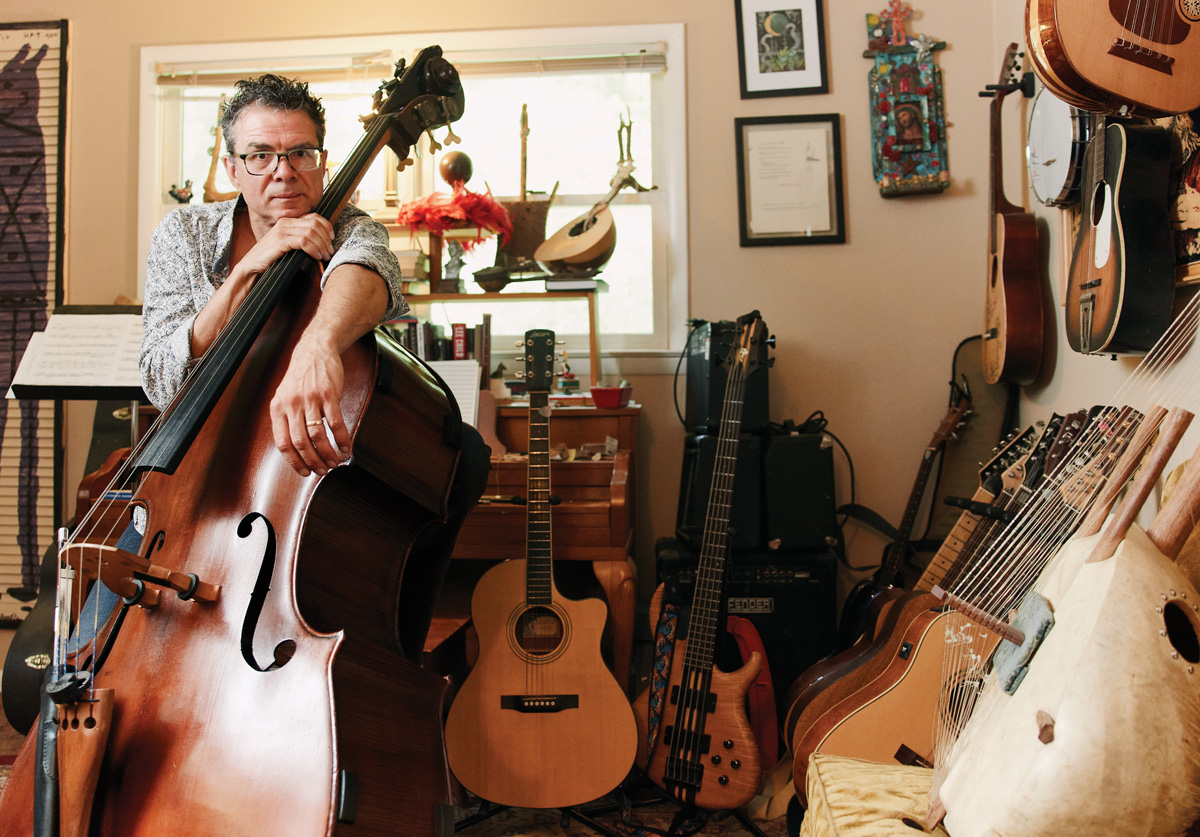
Photograph by Ben Rollins
Best Advice
“First of all, live. I think living a full, rich life is the best soil in which to grow your creativity. I’d probably say this is an example of the doctor not taking his own medicine. I don’t know if my life is full at the moment, but I don’t have social media and I try to spend as little time on my phone as I can. And learn to trust your curiosity and instincts. If you have a hunch that something might be fertile ground. . . dig deep.” —Lee Osorio
“I recommend that creatives be willing to accept criticism and let it be a dialogue.” —George Staib
“I would talk to professional writers and artists and ask, ‘How do you do it?’ And they’d give the same tired answer of, ‘If you’re going to be a writer, you have to write every day.’ The reality of being a millennial is that that’s just not a thing. I don’t have time to do this every day. I’ve been working two or three jobs since I was 22. I don’t have that capacity.” —Kelundra Smith
“Be authentic, as much as possible. Tap into your own source of inspiration and authenticity, because the things that come from an authentic place are the things that have longevity.” —Diane Durrett
“My advice for other creatives is to tell the truth. There are so many different forces weighing in on what we say and how we speak as creators. There are market forces, political forces, there are forces within our family and within ourselves. Will it be good? Is it right? Is it blah-blah-blah? All these things are seeking to penetrate, and I feel like it’s our duty to speak the truth as we see it, as wildly and as lovely and as passionately as possible.” —Garrett Turner
“I teach students to follow their intuition. Intuition won’t always give you what everybody else wants, but it will give you what you want. I teach them to keep writing until they run out of pencil, and to never be satisfied because if you’re satisfied, your standards aren’t high enough.” —Michael Kurth
![]()
Closing Thoughts
“I have definitely experienced impostor syndrome. Some of my struggles were because I am biracial and because I didn’t feel validated in being a Filipino American woman. I had to do the inner work to see myself that way. But now I am researching Filipino history and culture and making Filipino artwork and it’s important to me that Filipino and Asian audiences see it too.” —Jacque Pritz
“The creative process is a challenge. It allows me to ask big questions with no expectations of answers. It keeps me hungry, always on the lookout for the next source of inspiration. Honestly, it gives me a reason to go on living—there’s another moment of beauty I can share with the world just around the corner.” —Lee Osorio
“Collaborating with other artists is a gift. I play with some of the most ridiculously talented people in the world every day. I have learned how to write and orchestrate and how to not annoy them—you know, like where to put the page turn, or when they need to breathe, or change a pedal, all those things you don’t learn in school.” —Michael Kurth
“If the story’s not good, who cares? Nobody’s going to watch it, right? It’s about stories.” —Felipe Barral
“Slow down and take things in. So many great things happened at Ballethnic over the past six months, but we went from one thing to the next, then to the next, without stopping and absorbing them. We needed to take a deep breath and celebrate these great team accomplishments, show gratitude and sit in our own joy without running to the next thing. How can I be joyful if I don’t celebrate this life that I have been gifted? I tell my students: Let’s be grateful for having a brain that can create.” —Nena Gilreath
This article appears in our September 2025 issue.
Advertisement




